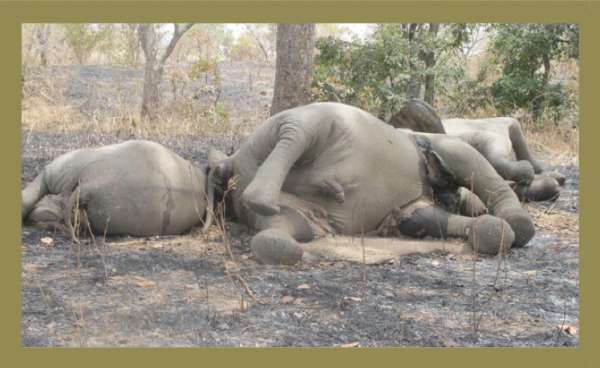|

This never happened. If you mention it you will be prosecuted
This past week reinforced how authorities in two countries – Tanzania and South Africa – seek to manipulate their local wildlife populations despite international scientific opinions about the ever declining population numbers of the species involved.
Elephants: It was revealed by a Tanzanian newspaper that the Ruaha National Park in Tanzania had suffered poaching at an industrial scale in 2014. In one year, the number of elephants dropped from about 8,000 to about 4,000 according to aerial surveys. In the greater Ruaha area that includes the National Park and surrounding hunting concessions, the population of elephants was reduced from 20,000 to 8,000 – a loss of about 12,000 elephants in a single year. The information had been provided to the Tanzania government in December last year but they attempted to keep it under wraps.
This latest slaughter comes hard on the heels of the revelation that the Selous Game Reserve and surrounding areas had lost about 58,000 elephants over a period of four years (2010-2013), another “small” detail that the Tanzanian government sought to keep quiet until it was publicly announced by the Frankfurt Zoological Society that had performed the aerial surveys.
To cap it all off, the Tanzania government a few days ago passed two Bills in Parliament to stifle and prosecute any criticism. The Bills are a clear indication that Tanzania is getting increasingly desperate to keep the poaching crisis under wraps. Called the “Statistics Bill” and the “Cybercrimes” Bill, they aim to severely punish the publication of statistics and data seen or perceived by the powers that be to be “defamatory, likely to disturb the public peace,” and being considered “misleading or inaccurate” by those in government who think that their dirty linen should not be hung up in public by the mainstream media or bloggers. This will very likely put a dampener on individuals and organizations who are willing to blow the whistle or go on public record over wildlife crimes.
"Should Tanzania President Kikwete sign the bills into law, wildlife conservationists and activists could face jail time for publishing any figures on poaching which are not approved and officially released by the government even though they might be based on the findings of such reputable organizations as the Frankfurt Zoo, which conducted the last elephant population survey in the Selous and can came up with devastatingly low figures.”
For Tanzania to contemplate such measures indicates how desperate they are getting – after all, the USFWS recently placed a ban on elephant trophy hunting imports from Tanzania, basically saying that the added pressure of trophy hunting on Tanzania’s decimated elephant population was not conducive to any conservation benefit for the species. Tanzania responded by sending a delegation to Washington to mention that Tanzania had the poaching situation well in hand, and that the population stood at about 100,000 elephants. Think again Tanzania, after the Ruaha massacre the next stop for the poachers seemingly operating with absolute impunity seems to be the Serengeti...
The desperation, of course, is all about money – Tanzania and the private hunting operators would lose significant revenue if trophy hunting of elephants was no longer possible, and it seems damage control is in full swing to persuade the naïve that all is well.
Lions: South Africa recently announced a proposal to place lions on their national listing of species of “least concern”, a downgrade from the present listing of “vulnerable”. This flies in the face of African and international concerns about the population status of the species. To achieve this ludicrous “least concern” status, South Africa needed to come up with a resident population of 1,600 adults. No worries, the solution was clear – combine the supposed 3,000 lions in the “wild” with the 6,000 lions in captive breeding programs to satisfy canned hunting and the magical (but completely non-scientific) 1,600 number is exceeded and the lions can be downlisted.
The proposal, cobbled together with very dubious “supporting” information (the last lion population survey of wild lions in Kruger was undertaken in 2009 for example) by the US based Panthera Foundation and the South African Council for Scientific and Industrial Research, is now open for public comment.
And comment LionAid will as the proposal is rotten to the core, unscientific, and unsupportable. The only beneficiaries would once again be the traders in lion products – hunting trophies, skins, bones, claws, teeth – you name it. South Africa cannot be in any way be called a conservation minded country – all policies seem geared to extract the largest amount of money from wildlife resources by whatever means. And local and international conservation organizations seem happy to go along with the proposals. Not us.
We will publish our reply to South Africa’s lion delisting proposal here once we complete it in the next few days. Please feel free to share widely – this nonsense must be nipped in the bud.
Picture credit: www.animalpeoplenews.org
|




